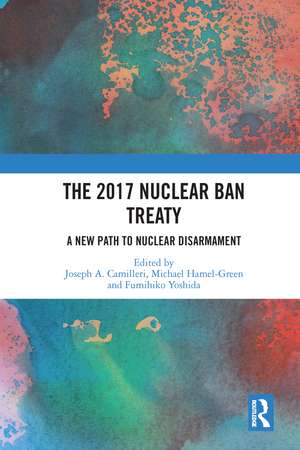The 2017 Nuclear Ban Treaty: A New Path to Nuclear Disarmament
Editat de Joseph A. Camilleri, Michael Hamel-Green, Fumihiko Yoshidaen Limba Engleză Paperback – 30 iun 2020
This book was originally published as a special issue of Global Change, Peace & Security but additionally includes the special section articles on the treaty in the Journal for Peace and Nuclear Disarmament.
| Toate formatele și edițiile | Preț | Express |
|---|---|---|
| Paperback (1) | 391.18 lei 6-8 săpt. | |
| Taylor & Francis – 30 iun 2020 | 391.18 lei 6-8 săpt. | |
| Hardback (1) | 768.82 lei 6-8 săpt. | |
| Taylor & Francis – 13 noi 2018 | 768.82 lei 6-8 săpt. |
Preț: 391.18 lei
Nou
Puncte Express: 587
Preț estimativ în valută:
74.87€ • 77.87$ • 62.74£
74.87€ • 77.87$ • 62.74£
Carte tipărită la comandă
Livrare economică 13-27 martie
Preluare comenzi: 021 569.72.76
Specificații
ISBN-13: 9780367583460
ISBN-10: 0367583461
Pagini: 296
Dimensiuni: 174 x 246 x 13 mm
Greutate: 0.52 kg
Ediția:1
Editura: Taylor & Francis
Colecția Routledge
Locul publicării:Oxford, United Kingdom
ISBN-10: 0367583461
Pagini: 296
Dimensiuni: 174 x 246 x 13 mm
Greutate: 0.52 kg
Ediția:1
Editura: Taylor & Francis
Colecția Routledge
Locul publicării:Oxford, United Kingdom
Public țintă
Postgraduate and UndergraduateCuprins
Introduction Rethinking the path to nuclear disarmament Part 1: Nuclear Ban Treaty: Rationale and Significance 1. Obstacles to understanding the emergence and significance of the treaty on the prohibition of nuclear weapons 2. A ‘light for all humanity’: the treaty on the prohibition of nuclear weapons and the progress of humanitarian disarmament 3. The diplomacy of resistance: power, hegemony and nuclear disarmament 4. Stigmatizing and Delegitimizing Nuclear Weapons 5. A Strategic Plan for Nuclear Disarmament: Engineering a Perfect Political Storm Part 2: The Role of Civil Society 6. Negotiating the UN treaty on the prohibition of nuclear weapons and the role of ICAN 7. The ICRC and the Red Cross and Red Crescent Movement: Working Towards a Nuclear-Free World since 1945 8. Why youth and feminist activism matters: insights from anti-nuclear campaigns in practice 9. Impacts of the nuclear ban: how outlawing nuclear weapons is changing the world Part 3: Verification 10. Verification and security of transformation to a nuclear-weapon-free world: the framework of the Treaty on the Prohibition of Nuclear Weapons 11. An international monitoring system for verification to support both the treaty on the prohibition of nuclear weapons and the nonproliferation treaty Part 4: National and Regional Perspectives 12. Japan and the Nuclear Weapons Prohibition Treaty: The Wrong Side of History, Geography, Legality, Morality, and Humanity 13. Ban Treaty: will it abolish nuclear weapons? A Japanese perspective 14. Nuclear non-proliferation and disarmament at the crossroads – a Mongolian perspective 15. The implications of the 2017 UN Nuclear Prohibition Treaty for existing and proposed nuclear-weapon-free zones Concluding Analysis Nuclear Prohibition: The Long Journey Ahead
Notă biografică
Joseph A. Camilleri Order of Australia Medal (OAM) is Emeritus Professor at La Trobe University, Melbourne, Australia and a Fellow of the Academy of Social Sciences in Australia, Canberra. He was the Founding Director of the Centre for Dialogue at La Trobe University, Melbourne, Australia (2006-2012). He has authored some 20 books and over 100 book chapters and journal articles. His research has centred on security and peace studies, governance, international political economy, religion and culture, and the Asia-Pacific region. He is the Founder and Executive Director of Alexandria Agenda, Melbourne, Australia - a new venture in ethical consulting specialising in governance, diversity, and education.
Michael Hamel-Green is an Emeritus Professor and former Dean in the College of Arts and Education at Victoria University, Melbourne, Australia. His research has focused on regional nuclear-weapon-free-zones, nuclear non-proliferation, and multilateral negotiations. He is a Co-Chair of the Panel on Peace and Security in Northeast Asia at Nagasaki University’s Research Center for Nuclear Weapons Abolition (RECNA), Japan; Chairperson of the Editorial Board of Global Change, Peace & Security; and Board Chairperson of the Australian Living Peace Museum, Australia.
Fumihiko Yoshida is a Professor and Vice Director of the RECNA at Nagasaki University, Japan. He is the Editor-in-Chief of the Journal for Peace and Nuclear Disarmament. He was Deputy Director of the Editorial Board of the Asahi Shimbun, Tokyo, Japan. He served as a member of the Advisory Panel of Experts on Nuclear Disarmament and Non-Proliferation for Japan's Minister of Foreign Affairs, Tokyo, Japan. He has a PhD in International Public Policy from Osaka University, Japan (2007).
Michael Hamel-Green is an Emeritus Professor and former Dean in the College of Arts and Education at Victoria University, Melbourne, Australia. His research has focused on regional nuclear-weapon-free-zones, nuclear non-proliferation, and multilateral negotiations. He is a Co-Chair of the Panel on Peace and Security in Northeast Asia at Nagasaki University’s Research Center for Nuclear Weapons Abolition (RECNA), Japan; Chairperson of the Editorial Board of Global Change, Peace & Security; and Board Chairperson of the Australian Living Peace Museum, Australia.
Fumihiko Yoshida is a Professor and Vice Director of the RECNA at Nagasaki University, Japan. He is the Editor-in-Chief of the Journal for Peace and Nuclear Disarmament. He was Deputy Director of the Editorial Board of the Asahi Shimbun, Tokyo, Japan. He served as a member of the Advisory Panel of Experts on Nuclear Disarmament and Non-Proliferation for Japan's Minister of Foreign Affairs, Tokyo, Japan. He has a PhD in International Public Policy from Osaka University, Japan (2007).
Descriere
This book analyses the implications of the new UN Nuclear Weapon Ban Treaty. Most of the chapters were originally published in a special issue of Global Change, Peace and Security, but the book also includes the special section articles on the treaty in the Journal for Peace and Nuclear Disarmament, and a new introduction and concl
